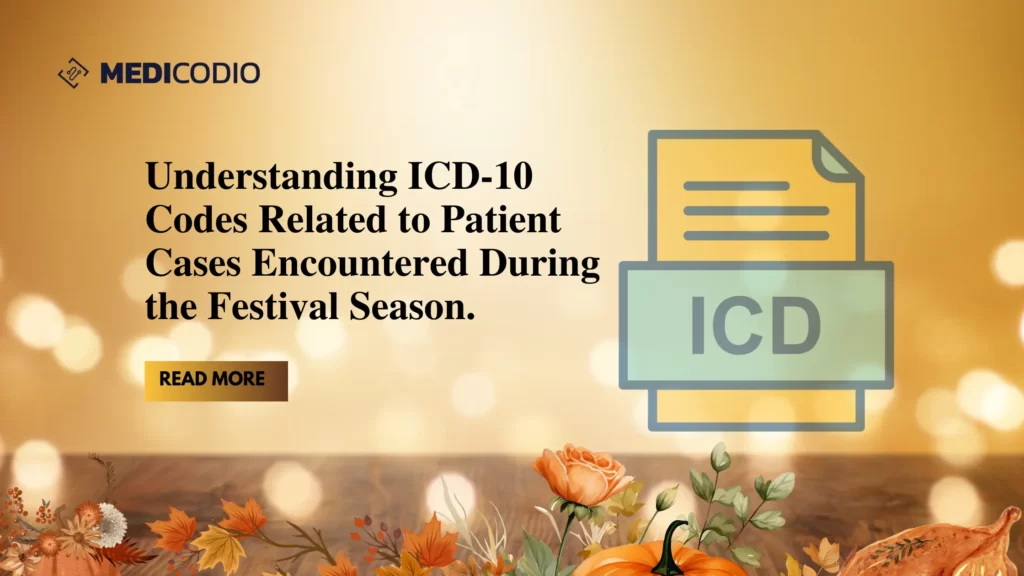As the aroma of roasted turkey wafts through the air and festive decorations transform the home into a welcoming haven, families gather to cherish the spirit of festivals such as Thanksgiving or Christmas. Amidst the joyous reunions and hearty feasts, it’s crucial to remain vigilant about potential hazards that can arise during this celebratory season. Unforeseen mishaps can occur for various reasons, and it’s essential to be prepared to address them promptly and effectively.
In healthcare, documenting such incidents involves utilizing specific codes from the International Classification of Diseases (ICD-10-CM). These codes serve as a standardized language for medical professionals to communicate and categorize patient conditions. Let’s delve into the ICD-10 codes commonly used for patient cases encountered during the festival season.
ICD-10-CM W60 for Contact with nonvenomous plant thorns and spines and sharp leaves.
This billable code is used for patient cases with an injury that occurred while collecting autumn leaves. People are often outdoors more during this time, engaged in activities such as gathering firewood, decorating with greenery, or foraging for wild plants.
ICD-10-CM Y92.7: Farm as the place of occurrence of the external cause
During festival seasons like Thanksgiving, farms can be particularly busy places, as families gather to celebrate and participate in traditional activities. This increased activity can lead to an increased risk of injuries, such as:
- Falls: Wet or uneven surfaces, ladders, and climbing equipment can all pose fall hazards at the farm.
- Machinery accidents: Farm machinery can be dangerous to operate, and even experienced operators can be injured if they are not careful.
- As many farms are open during the festival time there are many incidents or mishaps that happen at the farm. Y92.71 for the barn, Y92.72 for the chicken coop, and Y92.73 for an orchard.
Allergies- T78.40: Allergy
Another common case during festival times is Allergy.
Fall From a Tree: W14
Thanksgiving or Christmas often involves outdoor gatherings, family reunions, and activities like turkey bowling or backyard football. These activities can lead to increased foot traffic around trees, especially in areas with uneven terrain or slippery surfaces.
The festival decorations may involve hanging ornaments, lights, or other items on trees. The use of ladders or reaching into branches to decorate can increase the risk of falls.
Animal-related injuries: Animals can kick, bite, or trample people, and they can also transmit diseases.
W61.42- Struck by Turkey
Struck by turkey, initial encounter
W61.42XD
Struck by turkey, subsequent encounter
W61.42XS
Struck by turkey, sequela
This code signifies incidents where an individual is struck by a turkey. Whether it’s a forceful impact or a less severe encounter, this code denotes the occurrence when a turkey strikes a person.
W61.43 – Pecked by Turkey
W61.43XA
Pecked by turkey, initial encounter
W61.43XD
Pecked by turkey, subsequent encounter
W61.43XS
Pecked by turkey, sequela
When a turkey pecks or jabs at a person resulting in an injury, this code is assigned. The force of a peck might cause abrasions, lacerations, or puncture wounds.
W61.49 – Other Specified Contact with Turkey
W61.49XA
Other contact with turkey, initial encounter
W61.49XD
Other contact with turkey, subsequent encounter
W61.49XS
Other contact with turkey, sequela
This code encompasses a broader range of incidents beyond simple strikes or pecks. It includes diverse scenarios like scratches, scrapes, or other injuries caused by direct contact with a turkey.
Encounters with turkeys, especially in settings such as farms, wildlife areas, or even domestic environments, can lead to unexpected injuries due to their pecking behavior or territorial instincts. Understanding and using these specific ICD-10 codes ensures accurate medical documentation and billing procedures.
Importance of Proper Medical Coding
Accurate documentation using ICD-10 codes is crucial for medical professionals and insurance purposes. These codes not only help in describing the injury but also assist in determining appropriate treatment plans and ensuring that insurance claims are processed correctly.
AI Medical Coding Tools: A Solution for Efficient Coding During Festival Season:
Artificial Intelligence (AI) has revolutionized the healthcare sector, and medical coding is no exception. AI-powered medical coding tools streamline the process by assisting certified medical coders in several ways:
Quick Identification of Relevant Codes: AI algorithms can rapidly scan medical records and suggest appropriate ICD-10 codes for turkey-related injuries, saving time for medical coders during the busy holiday season.
Enhanced Accuracy: AI tools leverage vast databases and machine learning capabilities to improve code accuracy, reducing the chances of errors in coding and billing.
Efficiency in Documentation: By automating repetitive tasks, AI tools allow coders to focus on complex cases, ensuring thorough documentation and coding accuracy.
Real-time Updates: These tools stay updated with the latest coding guidelines and revisions, ensuring compliance and accuracy in code assignments.
Conclusion:
Festivals such as Thanksgiving is a time of joy and gratitude, can occasionally bring unexpected challenges, especially when dealing with turkey-related injuries. Certified medical coders equipped with knowledge of specific ICD-10 codes play a pivotal role in accurately documenting and coding these incidents.
AI medical coding tools act as invaluable assistants, aiding coders in swiftly and accurately assigning the appropriate codes, allowing healthcare facilities to efficiently manage the influx of cases during festive times.
As we celebrate Thanksgiving, let us acknowledge the significance of accurate medical coding in ensuring prompt and precise healthcare services for all, with AI-driven tools serving as a valuable ally to medical coders during busy and eventful times.
Learn more: Revolutionizing Healthcare Revenue Cycle Management with AI





